Conservative Investigative Journalist Mark Hemingway on Election Integrity
Mark Hemingway, conservative investigative journalist in America.
(MACHINE GENERATED)
Doug Truax: Welcome to the First Right podcast, a weekly conservative news show brought to you by Restoration PAC. I'm Doug Truax, founder, and president of Restoration of America. Today, we are blessed to have a special guest Mark Hemingway. One of the most conservative effective journalists in America. Mark has been all over the election integrity issue for years, and that's an issue we have to solve, or our Republic will dissolve. Hi mark. Thanks for coming on the show.
Mark Hemingway: Great be here.
Doug Truax: All right. So you've got some really impressive credentials. So give us, give us the thumbnail on your journalism background.
Mark Hemingway: I, at this point in time, it's fairly extensive. You know, I've, I've worked at two daily newspapers, three magazines and a financial wire service, and I'm currently a investigative reporter. I'm sort of a weird asterix in conservative history. And then I think I've been the only guy that's ever been a paid staff writer at the weekly standard, American spectator and national review. So, but you know, like I said, I, you know, I covered the fed for three years at our financial wire service. I worked at USA today, know I've done a lot of different things. So obviously I've, you know, done, you know, conservative journalism. But you know, I also worked at USA today. I covered the federal reserve at a financial wire service for three years in a way that was completely apolitical. Basically I've been around the block fairly extensively at this point in time in my career. There's not much really, I haven't done in journalism in one form or another currently investigative reporter, which is, you know, one reason why you're talking to me today.
Doug Truax: Yeah, absolutely. You've done some great work there. We want to talk about voter integrity today. And so going back to 2019, you had a great piece that you wrote back then about the voter rolls, which is not something that people talked a lot about back then. They talked about it quite a bit more now, but give us in your own words, the current state of play with the voter rolls across the country.
Mark Hemingway: So basically we have a horrible problem in this country, which is to say that according to the census information, about 10 to 11% of Americans move every year and that necessitates a lot of work to keep up accurate voter roles. And frankly elections in this country are underfunded. There's very little money that has historically been thrown toward election administration. And this means that very often people's names stay on the books in areas where they haven't lived or been registered to vote for, you know, a very long time. And it's resorted and it's resulted in all kinds of, you know, horrible distortions and problems. So like for instance, there was a lawsuit a couple of years ago involving judicial watch where they, they sued. And I think they got the, the city to basically agree because they had no choice under federal law and other things to, you know, fix well they sued Los Angeles and they got the city to agree to fix their voter rolls because they had no choice.
Basically under federal law, got to a point where something like Los Angeles had a voter registration rate of 130% meaning that they had 30%. They, they, that they had 30% more people on the voter rolls than actually lived in the county, you know, in Los Angeles county is not a small county. And, you know, like California in general had a voter registration rate of over a hundred percent, a couple of years ago, meaning that the state had taken no action over a period of decades, essentially to do the things that the federal law requires in order to make sure that voter rolls are accurate and up-to-date, and you know, California was, is egregiously bad in this regard, but states across the country are all bad on this issue. Both red states and blue states, you know, like I said, it's frequently just a problem of administration and lack of funding for this sort of thing.
It's not necessarily a political thing. Although in the case of California and some other things, there were definitely some political things that, that came into play basically when they pass a lot of these voter laws, when they passed a lot of voter laws in the nineties, you know, mandating federal laws, mandating that you clean voter rolls and stuff, California basically asked for a special exemption of Janet Reno, bill Clinton's attorney general so that, you know, that they interpreted basically that meant that he didn't have to apply within apply that none of these federal mandates applied to them. And so they went for years without being, without necessarily complying with this. And there was also a Supreme court decision in recent years that basically force states hand on this. So it's an ongoing problem that that needs to be cleaned up. And, you know, while, you know, having voter rolls that aren't, you know, cleaned up isn't proof of, you know, voter of, of corruption or any sort of voter fraud, it's certainly makes voter fraud much, much more likely.
You know, when you think about the pandemic, for instance, a lot of states decided that because of the pandemic, they were just going to send out ballots to every person on their voter rolls. Well, that meant in most places that, you know, there were going to be tens of thousands, if not more ballots, just being sent out to addresses where people hadn't lived in, you know, years. And that of course is a huge problem. You know, when you've got, you know, actual ballots floating around in the ether that people can just fill out and send back in and there's almost no effort made to, to check them.
Doug Truax: Yeah. And that's the problem. It gets to this lack of confidence that we all start to feel, whether you're not, you can improve the fraud. We all know that there's an opportunity for people to commit fraud. If that's sitting there like that. And somebody really wanted to put the effort into it, which is, which is the problem.
Mark Hemingway: And to be clear, we did see a few isolated, specific instances of this that were absolutely undeniable. I mean, there was a city council race in Patterson, New Jersey. It was invalidated specifically because one of the candidates there was, you know, going around doing things like apparently like scooping up baskets, full of ballots that were being dumped into lobbies of apartment buildings, you know, and there was, you know, substantial fraud involved in, in what was happening. So we know it provides the opportunity for this. And, you know, again, this is a huge problem. And, you know, I talked a little about California, but I don't know if I have, you know, quite captured the scale of this. I mean, pew, the pure organization, which again is nobody's idea of a right-wing organization, did a study in 2012. They concluded, I think that about one out of every eight, which is, which is about 24 million voter registrations in this country were substantially inaccurate, was the word that they used. So, I mean, this is a massive, massive problem if we're gonna have this massive push toward mail-in voting, but there's no corresponding effort to make sure that voter rolls were accurate.
Doug Truax: Yeah, absolutely. And so the, the big question now that we're faced with this problem is how do you see us getting out of this? How do we fix this?
Mark Hemingway: Well, one, like I said, that, you know, we've got to make an effort to, you know, invest in our election administration and, you know, and, and actually have some sort of, you know, enforcement mechanisms here for the federal law that mandates this sort of thing. And, you know, secretaries of state really have to take it upon themselves to make sure that these voter rolls stay accurate. And there have been some encouraging things that have happened that I've written about. So like Democrats have made a lot of hay out of attempts to clean up voter rolls as being, you know, Republicans attempts to, you know, disenfranchise voters, which is absolutely isn't true. Th this in fact was the heart of Stacey Abrams claim when she claimed that she was elected the governor of Georgia and, and it wasn't elected, even though she lost by a hundred thousand votes, she was claiming that because the governor of sorry, the secretary of state in Georgia had, you know, kicked off X number of people off the voter rolls over a period of like a decade that this meant that all these people were being disenfranchised.
No, it's just absolute insane. In fact, if anything, if you look at the numbers, the secretary of state in Georgia, in a state of 11 million people, you know, him removing, you know, however many hundreds of thousands of people off the voter rolls over a course of a decade odds are he probably didn't clear enough off, you know, when you think about, you know, 11 million people in 10% of them moving every year. So this has been distorted by Democrats that aning up the voter rolls is somehow an attempt at mass disenfranchisement in now, the secretary of state of Ohio did something interesting, I thought was encouraging, which is he's. He said, look, we're going to clean up the voter rolls. All right. And there's, there's nothing that you guys can do about that. But what I'm going to do is I'm going to bring in liberal groups of stakeholders here, and you're going to, you know, have a part in looking at the process here, you know, because the reality is, is that, you know, once you actually sit down and look at the voter rolls and you compare them to, you know, known addresses and other things like that, there's no denying that, you know, this is a problem.
So, you know, bringing in the local NAACP groups and some other things, you know, he was able to go about cleaning up the voter rolls in Ohio and sort of minimize the political controversy out of it. So it didn't look like so much of a closed door process, but, you know, if you groups on the right and left together that oversee the process then, well, you know, it becomes pretty obvious that it's not a political thing. It's just something that has to happen. So, you know, hopefully one states across the country will look at investing more in election administration and to bringing in different stakeholders to address the problem. Because, you know, when it's a unit party thing that's just done behind closed doors, then you know, you know, everybody's, you know, people don't talk about this much. The left is just as suspicious as well of what the right is doing with election stuff as the right is even though the media doesn't cover that angle. But I think if you can bring people to the table from both sides to oversee these kinds of processes, you know, you'll find that it gets done without incident for the most part,
Doug Truax: Right? It's that transparency. And you just said it right. There was so much gets done behind closed doors. And I think over time, this voter roll thing has been building because we haven't had the transparency that we needed. I would say, you know, a scale of, you know, a percentage scale, we had like 5% of transparency into the voter rolls based on how you can pull them down a different state or whatever else. One of the things we're doing, I know, you know, we've discussed this previously, a vote raft.com. We're systematically putting the voter roll up online. That's come straight from the state and put it out there for everybody to see so that we can get to full transparency because that's, you know, when you get to that place and every, everybody, no matter who you are, which side you're like, well, yeah, I guess we can all see it. And we can all crowdsource it, no matter what party you are. And then you get back to the full confidence that we need to have, which is the main problem. Now everybody's getting less and less confident year over year and the whole thing.
Mark Hemingway: Yeah, yeah. But you know, again, this is, this is the kind of like unsexy, you know, work that needs to be done. And there frequently isn't necessarily the, the money and the state budgets and other things, they may be interested in getting it done, but it just, it just has to be done if you care about free and fair elections. And in fact, this was an actively exploited in 2020, you know, obviously, you know, people watching this are probably somewhat familiar with the whole mark Zuckerberg controversy where Zuckerberg spent $350 million basically doling out grants directly to local election offices using democratic activists who were election experts. And there's a lot of controversy and analysis that now show that basically what was going on is they were running a democratic get out the vote operation out of local non-partisan election offices. Now there's some question about whether this, you know, might've been legal, but, you know, there's, there was nothing crazy about this in the sense that no one had ever, because what started, there was nothing brazenly illegal about it in the sense that no one had ever conceived of an idea where, you know, a billionaire would come in with $350 to shore up local election offices.
But the fact of the matter is a lot of local election offices, even in, in red areas were taking this money because they needed the money, you know, and, and the fact that it came with strings attached was a secondary concern. When you know, it, you're just trying to like, you know, make sure that there isn't long lines on election day. I mean, this is something that we have to take very, very, because you know, as long as our election offices are underfunded, they're going to be vulnerable to all kinds of manipulation, both by local authorities. And like in the case of Zuckerberg, hopefully that won't happen again. But, but in that case, we were very definitely manipulated by their, you know, overwhelming need for money.
Doug Truax: Yeah, absolutely. It's a great point. And it has gotta be more and more pressure and more, more visibility on this stuff. So voter rolls, Zuckerberg putting money in, what were some of the other prominent things you see out there with the previous election, or just elections in general that you consider, you know, we need to get this stuff fixed.
Mark Hemingway: Well, you know, from, from the election side of things, like, you know, it's, it's hard to say. I mean, basically the whole thing was, you know, it was just a mess, you know, especially with the pandemic and other things like that. I mean, I don't really have a lot to add other than, you know, beyond the specific issues of what I've talked about in terms of, you know, voter rolls. There is, you know, just a general lack of, you know, organization, you know, I mean, honestly, I think one thing that would help with the transparency was it, this is something that, you know, when I was helping my wife write her book or that we, you know, we came across it, I was sort of stunned about it. I didn't realize that there was a Republican, the Republican party, national Republican party had been under a consent decree that was put in place by a judge in like the early 1980s over some shenanigans involving a New Jersey election, which basically meant that the Republican party couldn't have election observers when the democratic party could have election observers across the country.
And that the sentence that, that, that consent decree was just lifted in, in 2020 and the Republican party didn't quite have the muscle memory in terms of having a partisan election observers out there. And in places that were, you know, fall in that were there to document whether or not the rules were being followed. And hopefully as, as you know, I mean, it was an absolute crime that this was allowed to persist for decades. The judge that put this consent decree in place, like kept this descent, the consent decree in place restricting the part of Republican party's election day activities. Well, after he, he basically retired and took senior status. I mean, it was an Obama appointed judge that finally lifted it. I mean, basically looked at it and said, like, this is crazy. So hopefully you'll have part, you'll have more partisan advisors on both sides and election day that are election observers and like watching a lot of this stuff, you know, and, you know, hopefully that won't devolve into, you know, more partisan warfare over this stuff. It will just be more sort of transparency and accountability, but, you know, we've got to have, you know, a sense of, you know, fairness in terms of what election observers are out there.
Doug Truax: Wow. That's really interesting about that. A consent decree. I didn't, I didn't realize that. And that goes to one of the things I was going to bring up too, is it just does seem like in general, Democrats are much more interested in the mechanics of the election than Republicans are like, you know, writ large over the decades here, obviously that contributes to it. But wouldn't you, would you say that in general to the CR the consent decree aside, would you say that Democrats seem to always have had more interest than just like the pure mechanics of an election than Republicans?
Mark Hemingway: Hmm. I mean, certainly there have been times, you know, you have had figures and Republican parties history over the years, like Karl Rove and Lee Atwater. I think that have been very keenly attuned to the, sort of the mechanics of elections, I think in re recent decades where it should say post Bush, post Bush two. That's that's certainly been true. You know, we talked a lot about him in, in the Molly's book, rigged about mark Elias, you know, the democratic super lawyer that was also involved in the whole crazy dossier scheme in his role in elections. Basically what happened was, is after 2000 Democrats narrowly losing that presidential election on various technicalities and Florida. I mean, let's be clear here. I mean, they've done all kinds of subsequent things since then that show that Bush won that election outright in terms of votes in Florida. But, but that really radicalized Democrats for them to really go after process stuff. And then you saw some things happen, like for instance, the election in, in Minnesota, that Al Franken won by 300 votes in 2008, and then ended up Franklin being the 60 vote, the deciding vote on Obamacare. That election was one where Republicans, I think were completely blindsided by how Democrats have good Democrats, good gotten at this stuff. I mean, they had all kinds of sophisticated processes for using demography to analyze, you know, who likely cast a disputed valid and things like that. And whether the person was likely to be Republican or Democrat and stuff. And they were very, very successful. In fact, there've been a number of analysis posts that Al Franken election to show that that election may not have been a gain of strictly accurate, even if it was one on the legal merits at the time.
So yes, I do think that, that they have been, you know, there's been a huge project on, on the democratic side to make hay about these things. And you've got to remember until, you know, J January 6th and that whole mess, you know, Democrats had disputed every single election they'd lost more or less, right. At least at the presidential level, since 2000. And I mean, in an official capacity with people in the, the, in Congress standing up to say that they thought the elections were legitimate, Hillary Clinton thought, you know, it was still saying, it is still saying that, you know, Trump wasn't able to digital president. And then, you know, you had all these, you know, races where Democrats fought tooth and nail and close elections for Congress and Senate, like the Franklin race. And I mentioned, and so there was a lot of money flowing toward Marquise specifically for that. So, yeah, I, I do think in recent years that it has been a thing that they've cared about more, but obviously post 2020, the right is getting in, in the action here because, you know, setting aside all of the voter fraud complaints, there is a lot of things that could be said about, you know, election administration and, you know, the way that laws were applied, various lawsuits, there were specific things that happened in Georgia in terms of how votes were counted. You know, there were a lot of votes counted in Georgia that, you know, they may have been valid Georgia voters, but they were voting in counties where they didn't live or precincts where they didn't live, which under Georgia law shouldn't have been counted, but they were, you know, and, and so there were lots of, of things that are very much in gray areas for Republicans in terms of, you know, maybe it's difficult to say, oh, the election result in 2020 was the legitimate in term because of Fort mass fraud. But there's all kinds of things around the margins of an election that was decided by, you know, 40,000 votes where things were awfully shady, one of the big things that happens and, and, and, and that it has been happening a lot and happened a lot in 2020 is this thing that the lawyers call Sue and settle. So what happens is a like mark Elias's group, we'll go to a state like North Carolina and like, like, and this actually happened in North Carolina where they will bring a lawsuit in a state like North Carolina, which is pivotal for the election where they have a democratic governor and they have, you know, maybe democratic, you know, officials in this, in, in state offices. And, and what will happen is, is the state will invalidate their democratically passed, you know, they're, bi-partisan democratically past election laws and agree to change all the election laws, according to the terms of the lawsuit as a settlement, rather than, you know, put the state through the onerous process of having to defend their own laws.
And that, that has happened multiple times. And that was like a huge thing that happened in North Carolina, for instance, I mean, they passed a bunch of election rules. Some, you know, like not that long ago with strong bipartisan majority is that we're basically just invalidated because the democratic governor said, oh, well, well, we're being sued by mark Elias. So we better just do what he wants without any sort of input or, or, you know, feeling any obligation to defend, you know, laws that were democratically passed and, and that sort of thing people have gotta be paying attention to. And I think cued into, because that's really not, not right.
Doug Truax: Yeah, absolutely. And, and the temperature of the base on the Republican side, the conservatives it's gotten really high on this stuff, because like what you're saying, it's just, it's kind of lawlessness, you know, you have these election officials, that's kind of doing whatever they want. And then you have these, what you just described with Elias. And some of these governors, they just go around the law that's been enacted and yeah, it could get people very frustrated. And we got to get the confidence back in the system and get everybody back on the same page going forward, because we don't want to end up in a bad way on this stuff. So this flip the politics. And so you see a red wave come in, or how are you feeling? How are you, how do you decide in this next election up?
Mark Hemingway: I mean, obviously, I mean, all the polls are telling us, you know, that it's going to be a major year for Republicans. I mean, I just don't, you know, there, there are a couple of things that are happening here. I mean, like if you just look at, say generic partisan preference in, in, in polls, you're looking at a situation here where you're seeing people turn against Democrats in a ways we've not, since we've not seen since 2010, which by the way, it was the worst defeat for that midterm election was the worst defeat for a major political party in America since the end of world war II. And we're possibly looking at something similar along those lines, but there's also another interesting thing that, you know, obviously, you know, I'm not just me, but a lot of people are paying attention to, you're seeing some pretty sharp turns in demography in terms of Hispanics are all of a sudden, very friendly to a Republican voters in a way that, you know, nobody could predict it.
I mean, if you know the Republican party and, and, and according to some polls you've seen where you've seen, like a majority of Hispanics are supporting the Republican party. I mean, I don't know what the Democrat party is going to do if that in any way, shape or form holds in the longterm. I mean, typically when you are, you know, Republican looking at an election, if you were getting 35, 40% of the Hispanic vote in a given election for a Republican candidate that is considered to be that that's in an indication of just an absolute blowout. And if the Republican party, you know, at both as a result of the knee jerk woke ism and believe it or not, a lot of Hispanics in this country understand the politics of immigration and what that means acutely and our setting with the GOP on that contrary to what Democrats have long thought, nevermind the, you know, the bread and butter economic issues, you know, that, you know, hardworking, Hispanic families have a reputation for being dependent on it's going to be, you know, a really, really interesting election for Democrats and, and, and humbling.
But at the same time, like we're seeing this weird dynamic in the democratic party where there are so beholden to certain ideologies and certain fringe special interests that there's like no one walking them back from the plank here. I mean, you know, even Hillary Clinton was out in a recent interview lately saying ease up on the pronouns stuff guys. And I just don't see that they have the will or the wherewithal to even like, know how to do that. You know, there's nobody that's going to tell, you know, Alexandria Ocasio Cortez in the party to sit down and shut up, you know, stop, you know, pretending that you're the face of the party, but so, you know, barring any sort of, you know, massive rejection of, of Biden and, you know, an economic turnaround and some, you know, way to appeal to Hispanics. I just don't see this being anything other than a bloodbath for Democrats.
Doug Truax: Yeah. Totally agree. Way too early to ask this question, I'm going to do it anyway. If you don't want to answer, you can bail on it. Cause it's not fair for me to ask, but so 2024 presidential race, what are you, what are you thinking right now?
Mark Hemingway: So it's interesting, you know, I think the conventional wisdom still holds, which is to say that if you know, Trump wants the nomination, then it's basically his, but there've been recent polling data about DeSantis. That is starting to question that assumption. I mean, think it's still early to rely on that, but I think it's also true that Democrats fixation on Trump is, is sort of a double-edged sword on one hand, it's hurting Democrats, because I think that people are tired of talking about Trump. Now, on the other hand, I think it's also hurting Trump because people are getting tired of talking about Trump. And so obviously Joe Biden has been a dismal failure in a lot of, you know, obvious ways as president, you know, COVID is not under control. The borders of mass inflation's rampant gas is high. I mean like this is, this is, you know, Jimmy Carter, 2.0, and people just generally feel, you know, the quote unquote malaise.
So any alternative to that, that represents a rebuke of what the Democrats are doing. That isn't Trump, there might be a lane for that. But look, I don't know. I mean, I will say that after the last six years or so politics, people have routinely underestimated Trump and his appeal and he's, he's got this weird sort of like, I don't know, you know, almost like rain man sense for cutting to the heart of issues and making himself relevant. So I'm not in any way, shape or form suggesting that, you know, DeSantis is going to best Trump. It just that, I think it's, there's a lane for DeSantis to do that in a way that there, there wasn't even a few months ago.
Doug Truax: Yeah. Right. Changing pretty quickly right now. But the interesting to watch I'm with you, we gotta get through this next one before we talk about the one after that too much, but yeah, looking good. So, Hey, mark, really appreciate all your work over the years, your bravery uncovering a lot of this stuff and, and just hard work going into it. And on behalf of a lot of conservatives, thank you for all that you've done.
Mark Hemingway: Yeah. Thanks for having this conversation. You know, like I said, you said it's important to lower the temperature and I agree. I, well, it's important to lower the temperatures. It's also important that we address the real issues. And I think that there's been a lot of stuff flying around there about quote unquote fraud that isn't helpful when there's a lot of like very obvious issues like voter rolls and you know, some of this, you know, illegal some of this stuff of, well, it may not be like brazen fraud, but it's a question of legality that we need to focus on. And I think we can just steer people in the right direction. We'll be in, we'll be in a good
Doug Truax: Place. That's right. That's right. You got to slug it out and do the right thing. So we're good. Well, thanks so much for coming on. We'll we'll talk to you soon then.
Mark Hemingway: Thanks for having me.
Doug Truax: All right. That's our show for today. Thank you so much for tuning in and for supporting conservative media. Don't forget that by working together and staying diligent, we conservatives can bring our country back to true greatness until next week. Let's all keep praying that God will continue to bless America
First. Right? A new kind of new summary without the liberal slant every morning in your inbox, always free subscribed by texting first right to 3 0 1 6 1 that's FIRSTRIGHT All caps. One word to 3, 0, 1 6 1 for more.
-
![[2023-03-22] Mark Finchem - [DS] Election Rigging Coverup Is Being Exposed...](https://hugh.cdn.rumble.cloud/s/s8/6/Y/3/S/R/Y3SRi.0kob.jpg) 47:36
47:36
ninjaman1994
1 year ago[2023-03-22] Mark Finchem - [DS] Election Rigging Coverup Is Being Exposed...
511 -
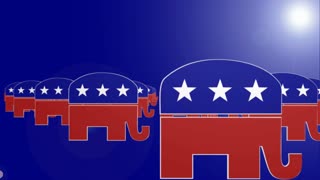 1:10:41
1:10:41
OFFICIAL Jovan Hutton Pulitzer Rumble
1 year agoRepublicans Standing In The Way Of Election Integrity
6.39K33 -
 1:01:33
1:01:33
FrankSpeech Lindell TV
7 months agoThe Gateway Pundit Exposes Election Crimes in GA
1.42K -
 3:57
3:57
Brad Klippert
1 year agoBrad Klippert on Election Integrity
4031 -
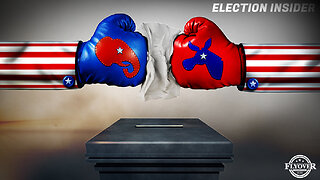 17:32
17:32
Flyover Conservatives
9 months agoELECTION INTEGRITY | Huge Strides towards Election Integrity - Matt Meck
10.3K2 -
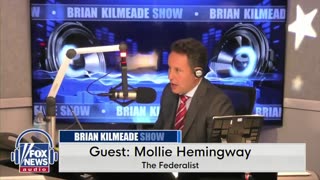 12:30
12:30
Tucker Carlson Tonight
1 year agoRepublican voters are tired of this- Hemingway
2.38K1 -
 3:18
3:18
galacticstorm
5 months agoFormer US Atty General Matthew Whitaker on Election Integrity
147 -
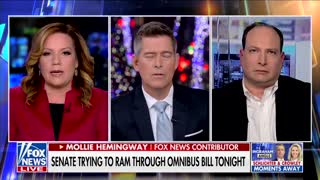 4:23
4:23
The Federalist
1 year agoHemingway: Senate Republicans Are Making A Mockery Of The 2022 Elections
5.54K4 -
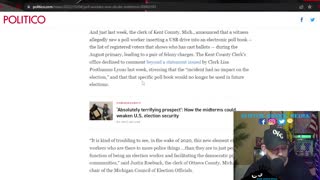 16:49
16:49
HydeNSeekMedia
1 year agoFormer CONGRESSMAN Convicted Of Election FRAUD And Poll Workers Deemed UNTRUSTWORTHY
7 -
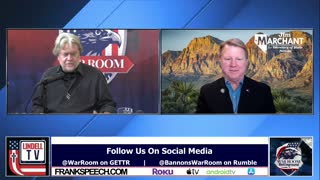 10:25
10:25
Bannons War Room
1 year agoJim Marchant On Candidates Who Prioritize Election Integrity Leading In Polls Across The Country
1.27K11